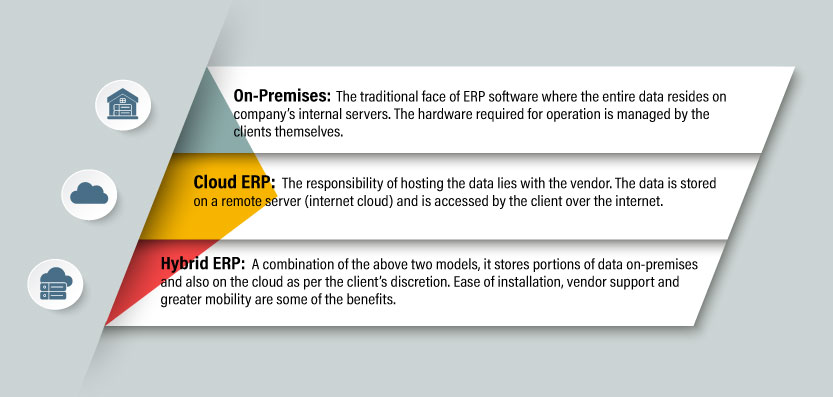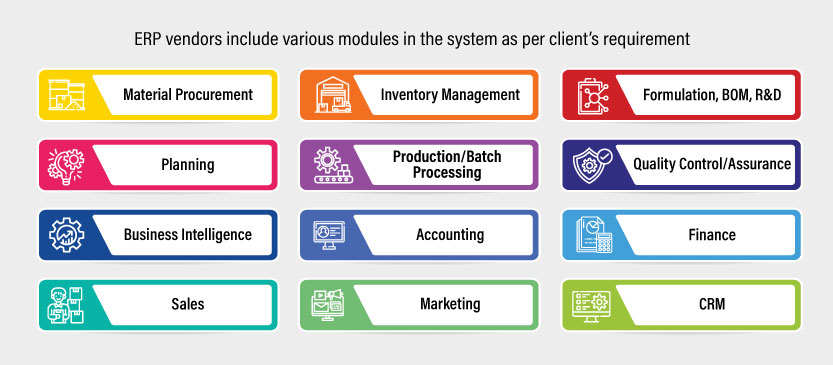What is Manufacturing ERP Software?
Overview
To fulfil the needs and wants of all the people on this planet, the scale of manufacturing is growing in proportion with the global population. And to meet the global demand, the manufacturing operations have gone global; Procurement from across the globe, manufacturing done in different parts, sales- as mentioned done in every nook and corner of the world. With so many moving parts, manufacturing can quickly become chaotic, if not managed properly. For smooth, integrated operations and streamlined workflows, more and more manufacturers are implementing business management software like manufacturing ERP in their organizations. This has raised curiosity among many as to what manufacturing ERPs really are. What’s their need? How are they useful? Are they worth the effort or it’s just hype? In this blog, we will discuss the definition, types, needs, components, benefits, applications & future of manufacturing ERP software. Keep reading!
What is Manufacturing ERP?
Manufacturing Enterprise Resource Planning or Manufacturing ERP is a modular business software that integrates & automates critical business functions to provide real-time data for informed decision making. Manufacturing ERP is a collection of separate but inter-dependent modules for business activities like production planning, procurement, inventory, manufacturing, compliance, finance, sales & marketing, etc. The integration of these modules in a single system facilitates the free flow of data and provides a single source of truth.
Data entries performed in any of the modules of a manufacturing ERP system are recorded, stored, and reflected in the same database. The existence of a single-yet-shared database ensures that an action triggered in one module updates the status of related processes and materials in all the other modules. The collection of an organisation’s transactional data from multiple data points in a singular location eliminates duplication, enhances integrity, and enables generation of synchronized reports on key business metrics.
Along with integrated data, a manufacturing ERP solution also provides smoother workflows and streamlined processes. Manufacturing ERP is developed by keeping industry standard practices in mind. Manufacturers can adopt these practices at the time of implementation to improve their existing business activities. With increased supply chain visibility, an ERP software for manufacturing brings about process modifications and workflow changes to further enhance productivity and increase profitability.
What are the types of Manufacturing ERP?
Depending on the needs of the manufacturing businesses, ERP can be implemented on-premises, on cloud and in a hybrid structure. Below is a description of all three models:

The components of Manufacturing ERP

The need for a Manufacturing ERP
The necessity of standardization is equally persistent for small businesses and big corporations both. They have to follow the same guidelines, meet the same quality parameters, and abide by the same regulations. They face similar challenges like managing resources, cutting costs, and thriving on ever-thinning margins. Manufacturing ERP helps organizations to streamline operations, reduce costs & wastages, stay audit-ready, optimize resources, enhance productivity, and increase profits.
Even if an organisation is using a management software already, a manufacturing ERP software can be implemented by seamlessly migrating all the historical data from the legacy system. This helps the organisation get rid of the disparate systems they use for different business functions and transfer their data onto a common database and unified dashboard.
With the widespread availability of cutting-edge technologies, Manufacturing ERP is now available for every manufacturing organization that needs it, irrespective of its size, structure & nature of business. Modern-day Manufacturing ERP solutions provide complete location-agnostic control over business processes and material movements through various access points including tablets and smartphones. With support for barcodes and RFID scanners, material movements can be tracked and processed right where they are happening - on the shop floor, at the shipping deck, or anywhere in the warehouse.
The applications of Manufacturing ERP
In its nascent stages, ERP was only implemented in discrete manufacturing facilities which involved production of easily distinguishable goods like automobiles, furniture, toys with countable parts like nuts, bolts, wires etc. With time, the need for ERP in process manufacturing was also felt urgently where formula-based calculations were supposed to be done involving activities like blending, mixing, heating etc. for manufacturers of food, pharmaceutical, paint, chemical, personal care, and similar industries.
The ever-increasing demand for innovative products is inspiring the incubation of innovative industries. Along with traditional manufacturing businesses, vendors are developing industry-specific ERP solutions for rapidly growing macro and micro industries as well. For example, BatchMaster ERP is one such solution that caters to traditional and newfound industries both, by collaborating with industry experts and adding/modifying specific modules to better suit their needs.
What are the advantages of Manufacturing ERP?
Apart from the obvious benefits of automation, below are some of the advantages of ERP:
- Streamlined processes: ERP streamlines the workflow and prioritizes important business functions
- Real-time reporting: Furnishes accurate real-time data for informed decision making
- Enhanced productivity: Eliminates redundant processes and optimizes cycles times
- Increased visibility: Provides complete control over the movement of materials and resources
- Improved agility: Enhances the business’ ability to respond to disruptions and minimize the impact
- Quality management: Facilitates the setting up and execution of standardized quality metrics
- Regulatory compliance: Keeps track of compliance requirements and regulatory guidelines
- Business scalability: Matches the growth of the business and updates automatically without extra budget
- Reduced costs & risks: Reduces operational & management costs, with data integrity and reduced risk.
95% businesses reported an improvement in business processes upon the implementation of Manufacturing ERP. It is promising to note that many businesses are realizing the need for an ERP system.
The future of ERP
By adopting technologies like cloud, big data analytics, the Internet-of-Things (IoT), Artificial Intelligence (AI) and Machine learning, ERP is taking giant strides in business intelligence. By identifying patterns in the equipment’s behaviour and furnishing intelligent insights, ERP vendors are laying the foundation for a bright future. Vendors are striving to solve critical business problems by making ERP powerful, flexible, and scalable on a cost-effective model.
Starting from a DOS-based software, ERP has come a long way and has a long way to go.















